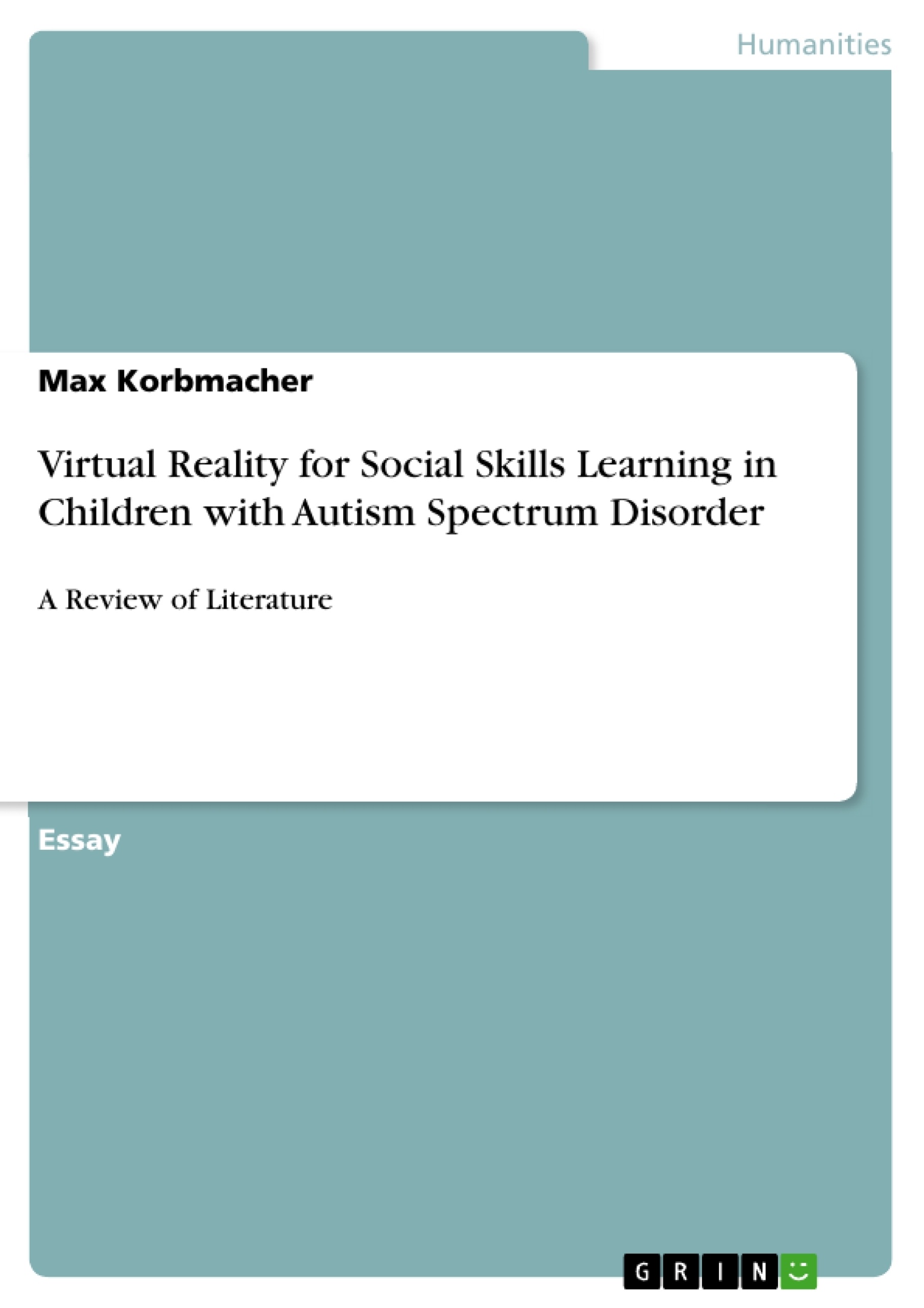In the essay, firstly, an overview of the current state of research on the improvement of social interactions and communication behaviours in children with autism spectrum disorder (ASD) are presented, and secondly, advantages and disadvantages of using VR with children with ASD are discussed.
Inhaltsverzeichnis (Table of Contents)
- Introduction
- Virtual Reality and Autism Spectrum Disorder
- VR and its application in education and therapy
- Social skills development in children with ASD
- Challenges and limitations of VR in ASD interventions
- Existing Literature on VR Interventions for Social Skills Learning in Children with ASD
- Effectiveness of VR interventions
- Case studies and preliminary evidence
- Generalisability of VR-learned knowledge
- Challenges and Future Directions in VR Interventions for Children with ASD
- VR sickness and technical challenges
- Need for standardized protocols and research design
- Developing personalized and adaptable VR interventions
- Conclusion
Zielsetzung und Themenschwerpunkte (Objectives and Key Themes)
This review aims to assess the current state of research regarding the use of virtual reality (VR) to enhance social skills learning in under-9-year-old children with Autism Spectrum Disorder (ASD). It explores the potential benefits, challenges, and limitations of using VR in this context.
- The potential of VR as an intervention tool for improving social skills in children with ASD
- The effectiveness of VR interventions compared to traditional methods
- The challenges associated with implementing VR interventions for children with ASD, including VR sickness and the need for standardized protocols
- The importance of personalized and adaptable VR interventions tailored to individual needs
- The need for further research to validate the effectiveness and generalizability of VR interventions for social skills learning in young children with ASD
Zusammenfassung der Kapitel (Chapter Summaries)
The review begins by discussing the potential of VR as a therapeutic and educational tool for children with ASD, highlighting its unique advantages for promoting social skills development. It then delves into the current body of literature on VR interventions for improving social skills in children with ASD, examining case studies and preliminary evidence. The review also explores the challenges associated with implementing VR interventions, including VR sickness, lack of standardized protocols, and the need for personalized interventions. The review concludes by emphasizing the need for further research to validate the effectiveness and generalizability of VR interventions in this context.
Schlüsselwörter (Keywords)
The main keywords and focus topics of this review include Virtual Reality (VR), Autism Spectrum Disorder (ASD), social skills, intervention, technology-based interventions, children, early childhood, social interaction, communication, adaptive functioning, generalizability, VR sickness, personalized interventions.
Frequently Asked Questions
How can Virtual Reality (VR) help children with Autism Spectrum Disorder (ASD)?
VR can be used as a controlled and safe environment to practice social interactions and communication behaviors, helping children with ASD develop essential social skills.
What are the advantages of VR over traditional ASD therapies?
VR offers unique advantages such as repeatable scenarios, adjustable difficulty levels, and a highly engaging, visual environment that can be less overwhelming than real-life social situations.
What is "VR sickness" and why is it a concern?
VR sickness refers to symptoms like nausea or dizziness caused by the immersive environment. It is a technical challenge that can limit the duration and effectiveness of VR interventions.
Can social skills learned in VR be applied to real-life situations?
The review explores the "generalisability" of VR-learned knowledge, emphasizing that more research is needed to ensure these skills successfully transfer to real-world interactions.
Why is personalization important in VR interventions for ASD?
Children with ASD have diverse needs and sensory profiles. Personalized and adaptable VR tools are necessary to cater to individual learning styles and sensitivities.
What age group does this research specifically focus on?
The research focuses on assessing VR interventions for social skills learning in young children, specifically those under 9 years of age.
- Quote paper
- Max Korbmacher (Author), 2019, Virtual Reality for Social Skills Learning in Children with Autism Spectrum Disorder, Munich, GRIN Verlag, https://www.grin.com/document/490287



